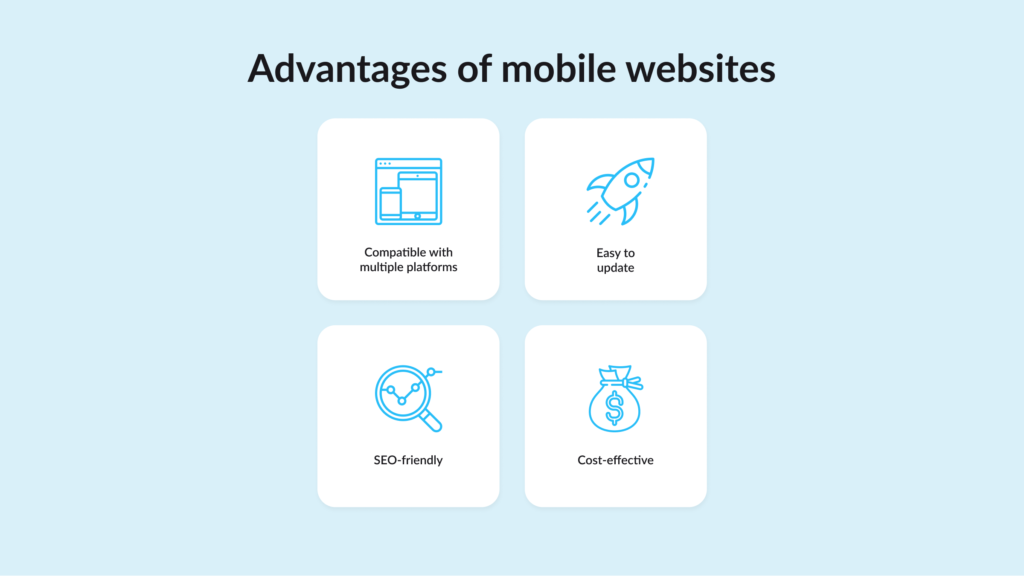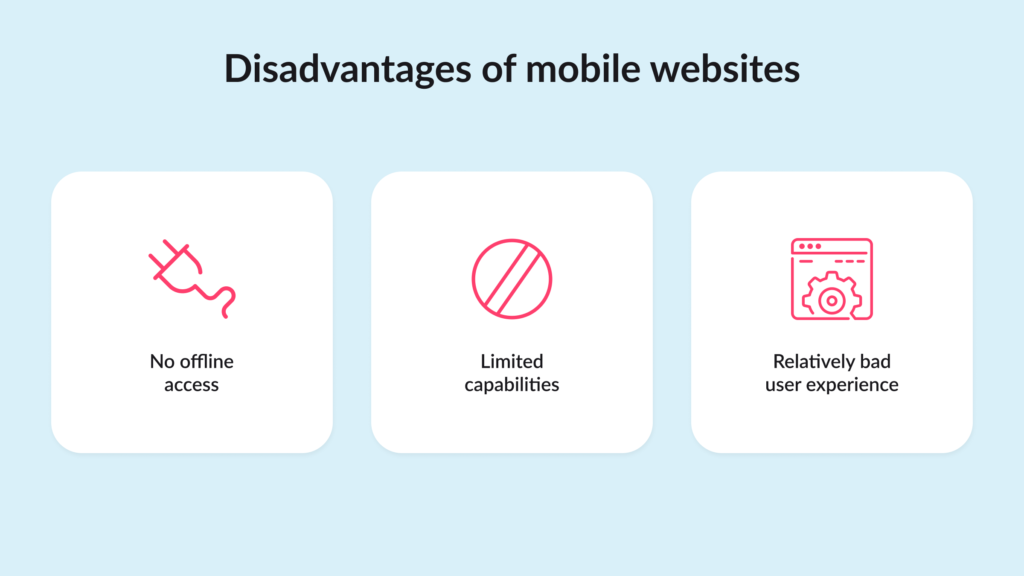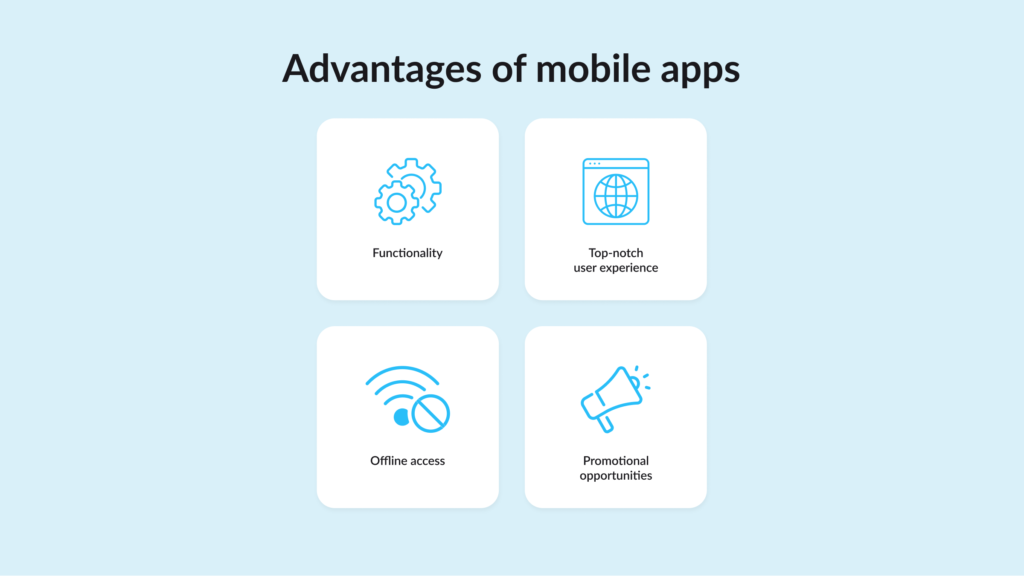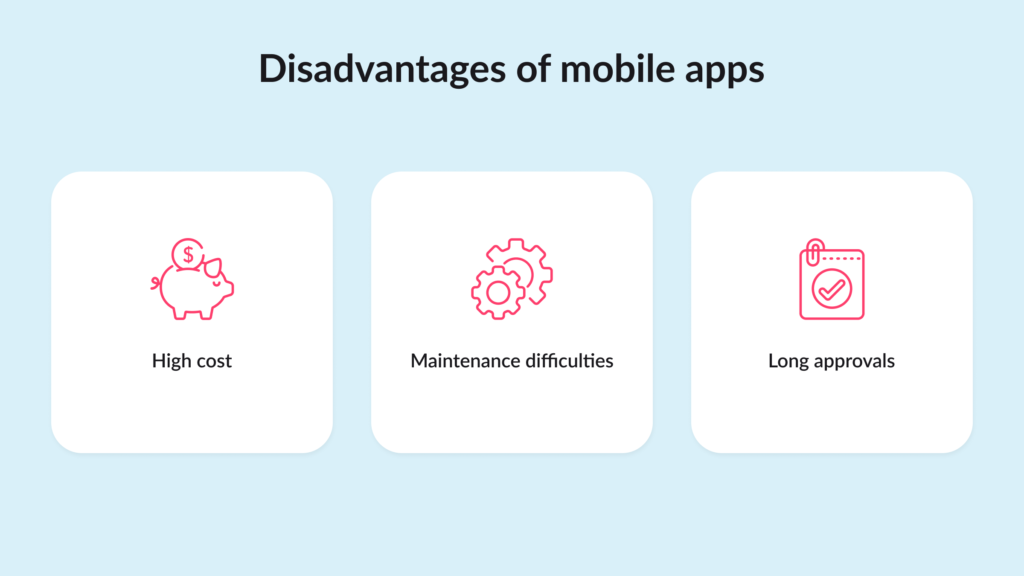Smartphones are now ruling the world. People increasingly choose online shopping, tickets booking, content consumption, etc., using their phones. So, this broad audience requires high-quality mobile applications and websites.
Nevertheless, companies do not always have the opportunity to develop both solutions simultaneously. So how to choose which one is better? Read this article to discover all the details about each alternative so you can select the one that suits your goals.
How Do App and Website Differ?
Foremost, let’s look at the primary dissimilarities between the two options. So, a mobile website is a particular number of pages connected and available via a browser. Also, their essential feature is the obligatory Internet connection.
A mobile app is a software designed for a specific OS (iOS or Android). It is installed from app stores and can sometimes function without Internet access.
The scale of financial investments is another aspect to consider. Building a website often will cost you less than creating a mobile app. Regardless, these factors are insufficient to decide, so let’s proceed to a detailed analysis.
Pros of Mobile Websites
So first, let’s consider mobile websites’ benefits.
Compatibility
A big plus of the website solution is its capability to be employed on all devices, regardless of their OS, version, screen resolution, and other peculiarities. Thus, you get a wider audience with just one solution.
Updates
Applications are required to be updated by the user through the app store, and only this allows them to receive new functionality. The website will provide it immediately after the update is released, so the users don’t have to make much effort to access the new advanced product’s features.
Search Engine Optimization
SEO works amazing for website promotion. It helps to boost your platform by involving more users. However, as for applications, they are most often ranked by rating, which makes their advertising more difficult.
Cost efficiency
As mentioned, website development is cheaper because you create a one-stop solution. Yet, if you plan to build a mobile app, you’ll have to hire app developers for each platform separately, increasing production expenses.

Mobile Websites Drawbacks
Nonetheless, any option has its weaknesses. Mobile websites don’t stand aside too.
Only online access
No matter how excellent your website is, accessing it without an internet connection is simply impossible. Hence, the only offline feature is to scroll previously cached pages without interaction. Here, the application provides more capabilities.
Functional limitations
Remember that the website is incapable of providing entire interaction with all device tools. So, for instance, iOS prohibits data exchange with the Siri voice assistant and sending push notifications. Regarding Android, there is no integration with the calendar and contacts.
However, using various APIs enables websites to use tools such as GPS, camera, and others.
User experience
Interaction with the website is limited mainly according to technical characteristics, unlike mobile applications, which are built precisely for a particular platform. Eventually, this factor can negatively affect poorly on the first impression of your product.

Benefits of Mobile Apps for Business
The popularity of mobile app utilization is enormously growing. Statista claims that the number of downloads all over the world among all segments increases yearly. Thus, this will help expand and strengthen the market’s influence. So, let’s see what else may be considered a mobile apps advantage:

Extended capabilities
Mobile apps take advantage of many more device capabilities than websites. So, they can access push notifications, voice assistants, tools like the accelerometer, and all the sensors. Therefore, if you seek advanced functionality, you should choose the application.
Improved user experience
Since the app is native and built with a specific operating system in mind, all elements run much more smoothly and improve the overall user experience.
Offline access
As mentioned, most applications can access required functions without an Internet connection. Thus, you may use this opportunity if your idea does not involve constant online interaction with the user.
Opportunities for promotion
A mobile app is a fantastic tool for reminding clients about your product. First, it is constantly shown to users on the smartphone’s main screen. Second, notifications are a great way to notify users about ongoing promotions and events.
Disadvantages of Mobile Apps
Even such a promising solution as creating a mobile application has drawbacks. These include:
Price
App development is associated with increased costs, as more sophisticated technology and an extended team are involved in its creation. In addition, since iOS and Android require different approaches, it is vital to involve other developers. However, to solve this problem, there is an option for cross-platform development on Flutter, which helps to reduce costs significantly.
Updates
Due to the ever-evolving nature of operating system versions, it becomes necessary to adapt the mobile application accordingly. Furthermore, one should consider the continuous emergence of novel devices within the market, which often come with varying form factors and technological advancements. To minimize any potential complications, it is advisable to collaborate with a software provider that offers extensive and sustained technical assistance for their products.

Waiting for an Approval
Unlike a website, which can be launched as soon as development is complete, a mobile app must pass validation before being allowed to download. So the release date has been pushed back.
Now you clearly understand the benefits and possible downfalls of both options. Let’s move on to summarizing.
Mobile App vs. Mobile Website
To make a final decision on whether to create a website or a mobile app, you must carefully analyze all the positive and negative aspects and see if each solution meets your primary business purpose.
A website requires less investment, will smoothly cooperate with all platforms, and will bring your audience broader access to your product on any device. However, it will only work out well with a proper Internet connection.
Contrarily, a mobile application maximizes the full potential of a specific device, offering a user-friendly and streamlined interface. Moreover, storing data directly in the device’s memory allows offline access. Nevertheless, the development process requires additional time and financial investment, and it is advisable to maintain frequent updates to comply with the latest operating system and device prerequisites.
Both options can profit your business, significantly widening your customer base and bringing many benefits. Creating a website first would be convenient, then proceeding with mobile app development.
If you’re seeking guidance on where to begin with your idea, reaching out to a seasoned software vendor can provide invaluable insights and assistance. They can recommend the optimal solution and bring it to life. By initiating the process of making your business mobile-friendly, you have the potential to surpass your rivals, fulfill your customers’ needs, and boost your financial gains.

Comments are closed